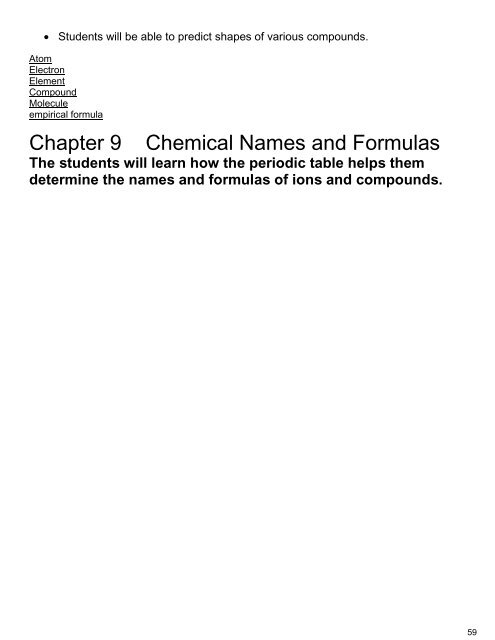Create successful ePaper yourself
Turn your PDF publications into a flip-book with our unique Google optimized e-Paper software.
Nuclear Fission<br />
The word fusion means "a merging of separate elements into a unified whole". Nuclear fusion refers<br />
to the "union of atomic nuclei to form heavier nuclei resulting in the release of enormous amounts of<br />
energy". Fusion takes place when two low-mass isotopes, typically isotopes of hydrogen, unite under<br />
conditions of extreme pressure and temperature.<br />
Fusion is what powers the sun. Atoms of Tritium and Deuterium (isotopes of hydrogen, Hydrogen-3<br />
and Hydrogen-2, respectively) unite under extreme pressure and temperature to produce a neutron<br />
and a helium isotope. Along with this, an enormous amount of energy is released, which is several<br />
times the amount produced from fission.<br />
Scientists continue to work on controlling nuclear fusion in an effort to make a fusion reactor to<br />
produce electricity. Some scientists believe there are opportunities with such a power source since<br />
fusion creates less radioactive material than fission and has a nearly unlimited fuel supply. However,<br />
progress is slow due to challenges with understanding how to control the reaction in a contained<br />
space.<br />
Both fission and fusion are nuclear reactions that<br />
produce energy, but the applications are not the<br />
same. Fission is the splitting of a heavy, unstable<br />
nucleus into two lighter nuclei, and fusion is the<br />
process where two light nuclei combine together<br />
releasing vast amounts of energy. Fission is used in<br />
nuclear power reactors since it can be controlled,<br />
while fusion is not utilized to produce power since<br />
the reaction is not easily controlled and is<br />
expensive to create the needed conditions for a<br />
fusion reaction. Research continues into ways to<br />
better harness the power of fusion, but research is<br />
in experimental stages. While different, the two<br />
processes have an important role in the past,<br />
present and future of energy creation.<br />
Summary Section<br />
Proton sare postivley charged of only one about 1 atomic mass unit/ Amu.Nuetrons have no charge and have a mass of 1<br />
amu . Elctrons carry one negative charge and have a mass of 0.00055 amu. Atoms in nature are nuetral so that the number<br />
of elctrons orbiting the nuclues equals the number of proton in the nuclues which make it stable but if thier not stable they are<br />
called ions. Alpha decay is a radioactive process in which a particle with two nuetron and two protons is forced out from the<br />
the nuclues of a radioactive atom. Aplha decay only accur in heavy elements. While on the other hand Beta deacy is a<br />
rafioactive procces in which electrons is taking in from the nuclues of radioactive atom. But both Alpha decay and Beta decay<br />
accur in istopes which means that they are very nuetron rich. After an decay their is various thing that acuur such as<br />
the nuclues bieng in very excited mode. This means that the decay has a result in which produces a nuclues which still has<br />
huge amount of energy to get rid of . Gammy ray is like nature to light or microwaves but huge amount of higer energy.<br />
Gamma rays is very diffrent from all electromagnectic radiation duee to the reason that gamma rays has no mass and<br />
no charge. Half life is the time in which time is required for the quantity of radioactive material to be reduced to one half of its<br />
origanl value. Fusion reaction take place in very high temperatures and gravitational forces. Fission means the splitting or<br />
breaking of parts.Nuclear fission releases heat by the slpiting of atoms. Both fisions and fussion are nuclear procces in<br />
which atoma re bieng modified to create energy . They are difrent due to the fact the appliaction are not the same.<br />
57



